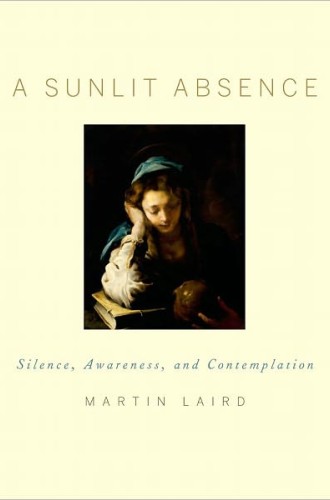A Sunlit Absence, by Martin Laird
It is not easy to do more than pay lip service to the scriptural call "Be still and know that I am God." As anyone who has tried with any regularity soon discovers, becoming still before God is not easy. It is said that Teresa of Ávila once shook her hourglass in frustration because her time of prayer was passing at a snail's pace. More recently Rowan Williams, the archbishop of Canterbury, wrote that his practice of contemplative prayer sometimes feels like an exercise in "twiddling my thumbs" and "shifting from buttock to buttock."
A Sunlit Absence, by Martin Laird, a professor of theology at Villanova University and a priest in the Order of St. Augustine, is filled with sympathy, grace and encouragement for those who have taken up the practice of contemplative prayer but are experiencing its inevitable challenges of boredom, distractions and racing thoughts. In this companion volume to his earlier Into the Silent Land (2006), Laird contends that these challenges are not obstacles but rather opportunities that help to reshape and refine our relationship with God. "Prayer," he writes, "deepens by way of ordeal."
Read our latest issue or browse back issues.
Contending with what Laird calls "our opera scores of inner chatter" is one of the most vexing challenges for those starting down the contemplative path. At a recent retreat I invited people to spend a couple of minutes silently noticing how many separate thoughts (fix an appliance, nurse a grudge, pay a bill) entered their minds. Most of the participants counted at least 20. One individual counted over 50! Not surprisingly, it is not unusual for people to give up on contemplative prayer after just one or two tries. They simply feel too beleaguered and discouraged by the torrent of their own "twittering chatter."
Drawing from his work with university students and other spiritual directees, Laird tells stories about people who are slowly learning how to detach themselves from the tyranny of their thoughts in order to open up more space for the quiet contemplation of God. Rather than fighting or reacting to these thoughts, these people gradually learn to simply observe and release them. Laird calls this the journey from being an "agitated victim" to being a "silent witness." The quiet repetition of a prayer word from scripture (Abba, Jesus, peace), he says, can be especially helpful as we let go of our inner chatter and focus our attention on God. Slowly, he says, quoting Evagrius of Pontus, we enter into "the open country whose name is prayer."
Laird's writing is refreshingly concise, occasionally amusing and vividly memorable. Both beginning and longtime contemplatives will discover treasures in this little gem of a book. He writes regarding the practice of repeating a prayer word, for example, that the word "need not always be said any more than a hawk in the sky needs always to flap its wings." At another point, he warns of the ego's ability to make even spirituality an area of competition and comparison. "Spirituality," he writes, can be "champagne for the ego. Cork after cork pops as the ego guzzles enthusiastically while reading up on what phase of the spiritual life it is in, what doorways of prayer it has pranced through."
Laird clearly feels that the long tradition of contemplation within Christianity has been neglected and underappreciated. "While Buddhism, Hinduism, and many other traditions have very much indeed that is wise and useful to say about concentration and awareness, Christian wisdom on the subject is little known among Christians themselves." He addresses this deficit by richly mining the writings and stories of Christian mystics like St. Hesychios, Evagrius of Pontus, St. Isaac the Syrian, the anonymous author of The Cloud of Unknowing, Theophan the Recluse and Amphilochios of Patmos. The two spiritual masters St. Teresa of Ávila and St. John of the Cross figure especially prominently.
This book takes its name from a poem by the Irish poet Seamus Heaney in which he describes "a sunlit absence" in his aunt's yard. Laird writes that as our contemplative practice matures, we experience a blossoming of the awareness that all of reality is "completely porous to the Divine Presence." "This luminous, flowing Vastness," he writes, "is constantly present whether we turn our gaze within or without, for in this Vastness there is no within or without."
Many of us claim not to have the time to pray. Laird, quoting Tessa Bieleckie, says that the key to the contemplative life is "the art of stealing time" throughout the day so that prayer is not so much something that we go to but something we come from. "When prayer becomes what orders our day," he writes, "as something we attempt to live out of moment by moment, rather than the tail blindly pinned onto the donkey of daily life, then prayer will integrate us into itself."







